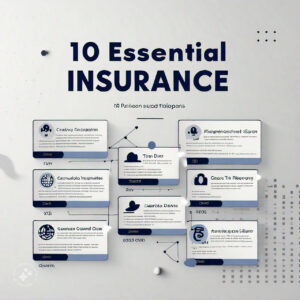Understanding Indexed Universal Life Insurance: Risks, Rewards, and Financial Planning
Indexed universal life insurance (IUL) is a type of permanent life insurance that offers the potential for cash value growth tied to the performance of a stock market index, such as the S&P 500. It combines the death benefit protection of traditional universal life insurance with the potential for cash value growth through indexing.
Cash Value
One of the main advantages of IUL policies is their potential for cash value growth. Unlike traditional universal life insurance, which has a fixed interest rate for cash value growth, IUL policies allow the cash value to grow based on the performance of a market index. This means that policyholders have the opportunity to participate in the potential gains of the stock market, without actually buying stock or being subject to the risks of individual stocks.
Flexability
In addition to the potential for cash value growth, IUL policies also offer flexibility in terms of coverage amounts, premiums, and death benefits. Policyholders can choose the amount of coverage they need and can adjust their premiums and death benefits as their needs change over time. They can also make additional contributions to the policy, which can help increase the cash value and death benefit.
IUL policies also offer tax advantages. The cash value of an IUL policy grows on a tax-deferred basis, meaning that policyholders do not have to pay taxes on the growth until they withdraw it. This can be a significant benefit, especially for those in higher tax brackets, as it allows the cash value to compound over time without being eroded by taxes.
Financial Planning
Another benefit of IUL policies is that they can be used as a financial planning tool. Policyholders can use the cash value of an IUL policy to cover expenses such as college tuition, a down payment on a home, or retirement income. They can also borrow against the cash value of the policy, which can be a useful source of funds in times of financial need.
Potencial Risk
It’s important to note that IUL policies are not without risk. The cash value of an IUL policy is tied to the performance of a market index, which means that it can fluctuate based on the performance of that index. This means that policyholders could potentially see a decrease in the cash value of their policy if the market performs poorly. It’s important for policyholders to carefully consider their risk tolerance and to understand the potential risks and rewards of an IUL policy before purchasing one.
Fees
In addition to the potential risks, it’s also important to carefully consider the fees associated with IUL policies. These policies typically have higher premiums and fees than term life insurance policies, which can eat into the cash value of the policy. Policyholders should be aware of these costs and how they may impact the overall performance of the policy.
Despite the potential risks and costs, IUL policies can be a great choice for those who are looking for a permanent life insurance policy with the potential for cash value growth and the flexibility to adjust coverage and premiums as their needs change. It’s important to carefully consider the potential risks and rewards of an IUL policy and to work with a financial professional to determine if it is the right choice for your individual circumstances.
- “The Top 5 Benefits of Indexed Universal Life Insurance”
- “The Benefits of Indexed Universal Life Insurance: Why IUL Policies are a Great Choice”
- Get the Most Long-Term Protection for Your Money with Indexed Universal Life Insurance (IUL)
- The Benefits of Indexed Universal Life Insurance for You and Your Family
- IUL Life Insurance: Understanding the Benefits






